Questões de Língua Inglesa da Fundação Universa (FUNIVERSA)
Lista completa de Questões de Língua Inglesa da Fundação Universa (FUNIVERSA) para resolução totalmente grátis. Selecione os assuntos no filtro de questões e comece a resolver exercícios.
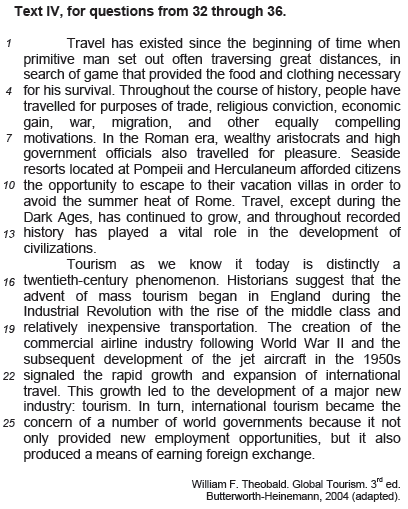
It can be deduced from the text IV that
- A.
some of the historic events that took place in late 19th century and after World War II became key factors in the development of tourism.
- B.
the industry of tourism was already fully developed in late 19th century Britain.
- C.
the history of tourism shows that governments and tourist authorities were very aware of all its economic potential well before World War II.
- D.
travel has always been synonymous with what we nowadays call tourism.
- E.
ancient Romans could only afford to visit nearby seaside resorts.
Choose the incorrect alternative concerning some principles that underlie the Audiolingual as a language teaching method or approach.
- A.
Language forms do not occur by themselves; they occur most naturally within a context.
- B.
The purpose of language learning is to learn how to use the language to communicate.
- C.
Attempts to communicate may be encouraged from the very beginning.
- D.
Each language has a finite number of patterns.
- E.
The learning of a foreign language should be the same as the acquisition of the native language. So, it is not necessary to memorize rules in order to use the native language.
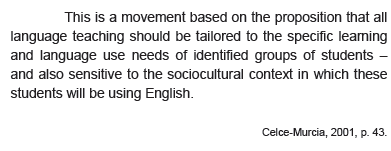
The paragraph above summarizes the basis of a movement abbreviated as
- A.
ESP.
- B.
CBLT.
- C.
CLT.
- D.
NCTE.
- E.
ELT.
Text V, for questions from 29 through 33.
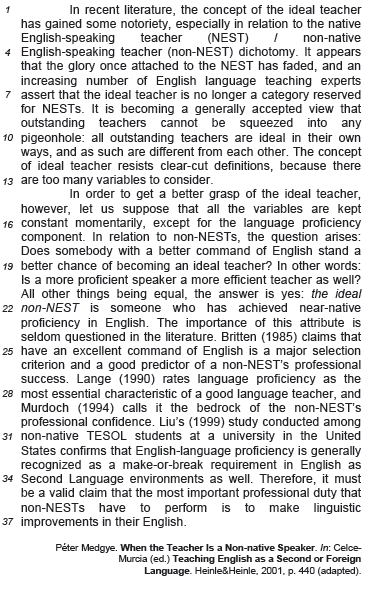
In relation to the text V, it can be assumed that
- A.
it aims to clarify the importance of studying English in an English-speaking country.
- B.
it deals with the to be or not to be an English teacher dichotomy.
- C.
there is no ideal teacher.
- D.
it is an attainable goal to define an ideal teacher.
- E.
it failed in his attempt to compare outstanding and non-outstanding English students.
Text V, for questions from 29 through 33.
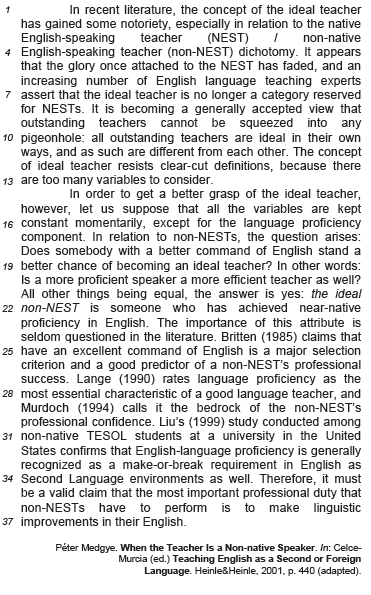
According to the text V,
- A.
non-NESTs cannot make good teachers.
- B.
nowadays, NESTs keep the unshakable status of ideal teachers.
- C.
to speak English almost as well as a NEST is a possible fulfillment for a non-NEST.
- D.
to be good teachers, NESTs need to overcome the lack of proficiency.
- E.
there is no literature about the performance of non-NESTs.
Text V, for questions from 29 through 33.
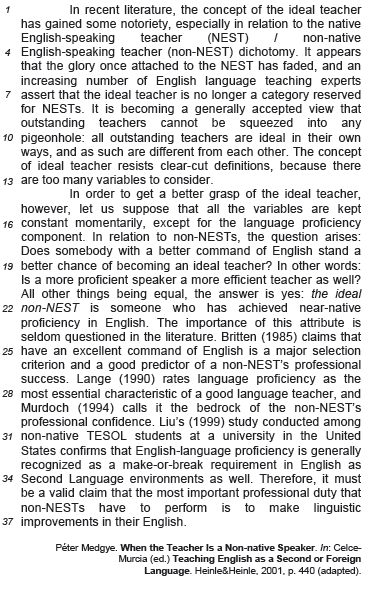
From the text V, it can be concluded that
- A.
Britten, Lange and Murdoch agree about the importance of an excellent proficiency in English.
- B.
Britten, Lange and Murdoch disagree about the importance of an excellent proficiency in English.
- C.
Britten and Lange agree about the importance of an excellent proficiency in English, but Murdoch disagrees.
- D.
Britten and Murdoch agree about the importance of an excellent proficiency in English, but Lange disagrees.
- E. Lange and Murdoch agree about the importance of an excellent proficiency in English, but Britten disagrees.
Text V, for questions from 29 through 33.
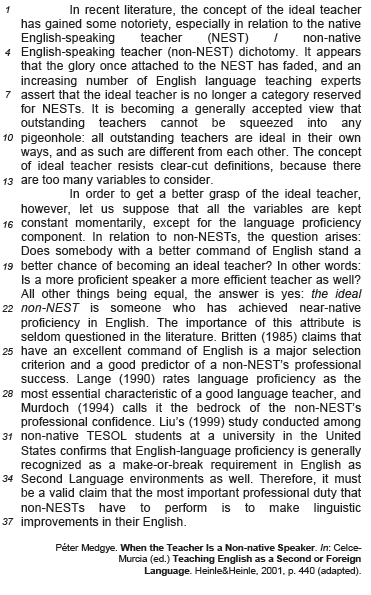
Choose the correct alternative based on the fragment below:
It is becoming a generally accepted view that outstanding teachers cannot be squeezed into any pigeonhole
- A.
The word outstanding is a verb in its present participle form.
- B.
There are only active voice sentences in the fragment.
- C.
The verb to squeez is the infinitive form of squeezed.
- D.
The verb squeezed is in its simple past form.
- E.
The noun pigeonhole means one of a set of small boxes, open at the front, in which letters and messages are left for different people.
Text VI, for questions from 34 through 38.
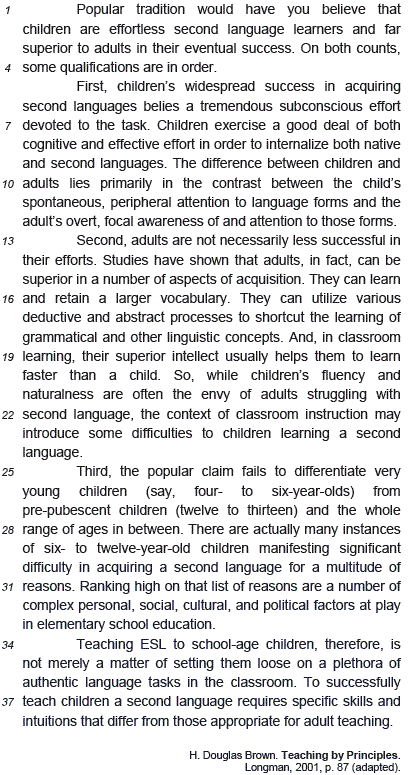
About the text VI, choose the incorrect alternative.
- A.
It presents some misconceptions about children second language learning.
- B.
It shows some beliefs about adults and children second language learning.
- C.
It states that not only children, but also adults can learn a second language.
- D.
It says that it is necessary to employ dissimilar techniques while teaching second language to adults and children.
- E.
It asserts that it is advisable to use authentic materials in a language class.
Text VI, for questions from 34 through 38.
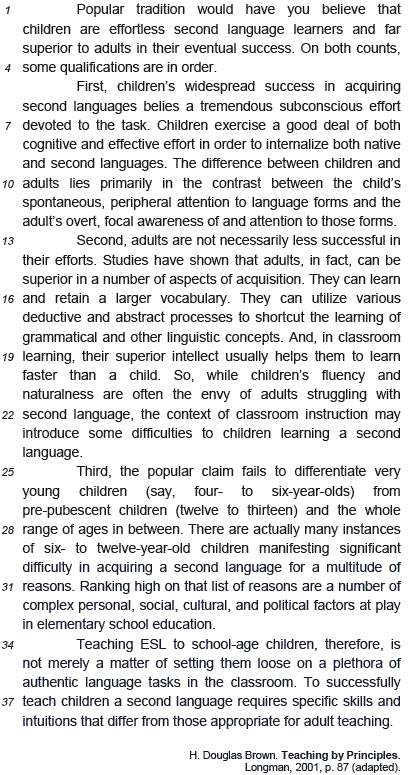
About children as language learners, it is possible to conclude, according to the text VI,
- A.
it is acceptable and common for children to have short attention spans.
- B.
children can rely majorly on their cognitive abilities to learn a second language.
- C.
children begrudge the time spent learning a foreign language.
- D.
children learn a second language so effortlessly as if its a game.
- E.
young childrens and pre-pubescent childrens peculiarities must not be taken into account.
Text VI, for questions from 34 through 38.
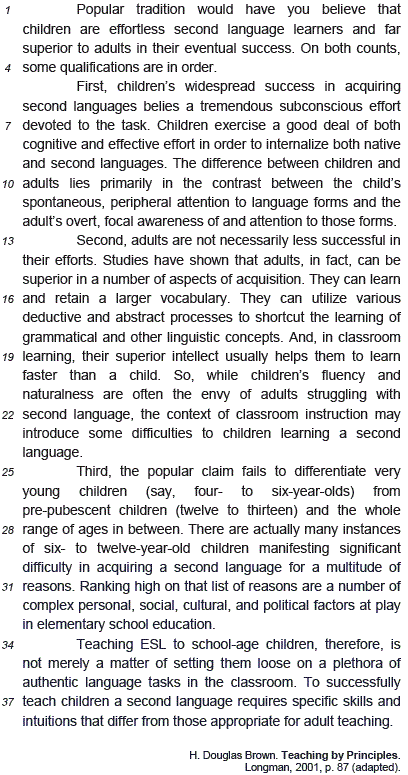
About adults as language learners, it is incorrect to assume that
- A.
they are able to do tasks that require a great amount of attention.
- B.
they can turn their deductive skills to good account.
- C.
adults wish they could be as fluent as children.
- D.
they are more able to handle abstract rules and concepts.
- E.
due to the age, adults have more trouble keeping new vocabulary.


